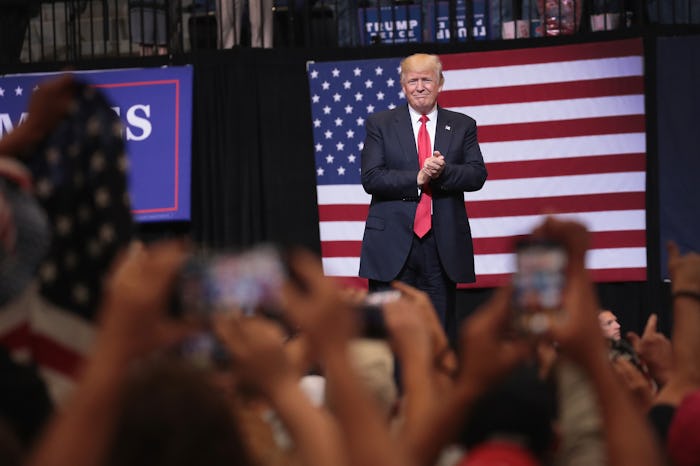News

Trump Says "Poor Person" Should Work On The Economy
At a campaign-style rally in Iowa this week, President Donald Trump stood before thousands of supporters and (once again) told the world exactly who he is and what he values. In explaining his picks for overseeing the nation’s economy — billionaire asset investor Wilbur Ross as Commerce Secretary and former Goldman Sachs CEO Gary Cohn as his chief economic advisor — Trump touted their success at amassing billions of dollars in personal wealth, rather than pointing to any related policy expertise. More than any other qualifying trait, Trump said that he wanted rich people, rather than poor people, making decisions about economic policy in his administration. With some 90 percent of American households owning less than 25 percent of the nation’s wealth, that kind of value statement from a sitting president is more than a little concerning.
It’s no secret that Trump values insight from the super-rich. In assembling his administration, Trump placed enough billionaires in charge of government agencies to make his Cabinet the wealthiest in U.S. history. And, in a speech in Cedar Rapids on Wednesday, he explained why. “These are people that are great, brilliant business minds," Trump said, according to ABC News. "That's what we need. That's what we have to have. So the world doesn't take advantage. We can't have the world taking advantage of us anymore.”
Why Trump thinks world business leaders would be less likely to “take advantage” of administration officials with a labyrinth of personal investments and financial entanglements is unclear. Still, he continued to clarify his point to the crowd, adding that he has nothing against poor people, really, according to ABC News:
I love all people. It rich or poor. But in those particular positions, I just don't want a poor person. Does that make sense? If you insist, I'll do it — but I like it better this way.
But stacking his Cabinet with super-rich people without actual policy experience has serious implications for the millions of Americans who will never see that kind of wealth. Speaking to CNN’s Newsroom on Thursday, Massachusetts Sen. Ed Markey questioned Trump's logic.
Being rich doesn't mean that you have wisdom. It doesn't mean that you have compassion. It doesn't mean you understand the lives that most Americans are living.
And that’s the most important point. Considering that America has wider disparities in wealth and income than any other developed nation, what should matter is whether Trump’s advisors have amassed the kind of insight and expertise it takes to manage the nation’s economic agenda. And Trump’s track record for picking people who understand the scope and impact of their appointments… well, it hasn’t been great.
There’s Education Secretary Betsy DeVos, the Amway heiress whose prevailing stance as an advocate has been to promote charter schools as an alternative to public education. During her confirmation, DeVos tripped up some of the basic issues related to public education policy, including federal special-education requirements and the current debate over measuring student progress according to proficiency standards versus personal growth.
Then, there’s Seema Verma, the president's pick to lead the Centers for Medicare and Medicaid Services, who said in her confirmation hearing that maternity care should be optional. At best, that line of thinking absolves millions of men from helping to care for pregnancies they helped create. But far more troubling was how Verma’s statement about maternity care ignores the reality that will hit millions of women should it come to pass: unless the benefit is included on every policy, coverage will become so expensive that it won’t be affordable at all.
Finally, since we’re talking about poverty, I think we have to at least mention Trump’s housing secretary who argued that “poverty is a state of mind,” ignoring entire libraries of evidence that have found, first, poverty is not easily overcome, and, second, poverty is perpetuated by policies that ignore exactly what it takes to get by on next to nothing in America.
A career in public service usually doesn't lead to the kind of wealth that Trump seems to value. Coming through the ranks of the nation’s foremost think tanks, nonprofits, and public-private partnerships may be a kind of “finishing school” for understanding domestic policy, but it usually doesn’t lead to the kind of wealth one earns in the private sector. And by only picking people with extreme wealth as his advisors and policy stewards, Trump has shown -- once again -- that he doesn't care about policy or how policy decisions have kept so many in America on the down side of the economic spectrum.
Donald Trump doesn't put much value in understanding, or truly advocating for, poor people. Before now, his policies may have hinted at it. But, in Iowa this week, he came right out and said it. And it's time we take him at his word.